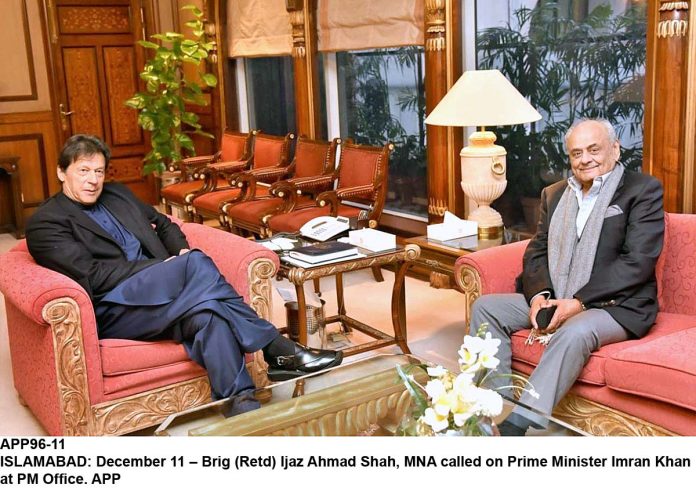Why has Prime Minister Imran Khan chosen Brig (retd) Ijaz Shah – someone who allegedly helped to harbor Osama Bin Laden inside Pakistan and was named by former Prime Minister Benazir Bhutto as someone to be held responsible if something happened to her – to join his cabinet.

In a 2012 television interview former head of ISI General Ziauddin Butt claimed that “Brigadier Shah harboured the world’s most wanted criminal for years, at the same time that other arms of the Pakistani military and the US were hunting him. “The most important and all-powerful person in [the] Musharraf regime was Brigadier Ijaz Shah, then Intelligence Bureau chief,” General Butt said in a television interview. “I fully believe that Ijaz Shah had kept this man [Osama bin Laden, in Abbottabad] with the full knowledge of Pervez Musharraf.”” Further, “Butt said the Abbottabad compound was built to bin Laden’s specifications on Brigadier Shah’s orders.”
A 2012 The Age (Australia) writeup provides details about Shah’s involvement with harboring Bin Laden. “in the then little-known garrison city of Abbottabad, near the Pakistani capital, construction had begun on an imposing, three-storey walled compound in the suburb of Bilal Town. It was being built to harbour the world’s most wanted terrorist, Osama bin Laden. It was built — allegations have now emerged — at the direction of the man sitting down to dinner at Yarralumla: Brigadier Ijaz Shah.
Author Arif Jamal “believes the allegations are credible and that retirement will have made little difference to Brigadier Shah’s influence. “Men like Ijaz Shah don’t retire in Pakistan, they keep playing different roles for the military,” Mr Jamal said. “Ijaz Shah was very powerful when Musharraf was in power, and it makes sense that he knew (of bin Laden’s whereabouts). But I don’t buy the theory that only the Intelligence Bureau was taking care of Osama bin Laden. Other people in the military were also involved. I think a dozen or so very senior people knew.” Mr Jamal said General Musharraf, still head of the army, almost certainly knew bin Laden was being protected. “I think Musharraf had to have known. The Pakistan army is a very well-ordered army, there is a chain of command, I don’t think it would have been possible without his knowledge.””
Shah “was the military’s “handler” of Kashmiri terrorist Omar Saeed Sheikh. In 2002, Sheikh kidnapped Wall Street Journal reporter Daniel Pearl and handed the US-Israeli citizen over to other militants, who beheaded him. Days later, Sheikh handed himself into Brigadier Shah, who held him for a week in a safehouse before finally handing him over to authorities, allegedly to give Pearl’s murderers a chance to escape.”
And before her assassination, former Pakistani prime minister Benazir Bhutto alleged “Brigadier Shah was conspiring with terrorists to assassinate her, naming him in a letter as someone who should be investigated if she died. Brigadier Shah was in charge of Bhutto’s security detail, which failed to protect her, on the night she was killed in 2007.”
What is interesting is that in 2004, when Musharraf nominated Shah as High Commissioner to Australia “he was rejected by Canberra, it is understood, out of concern over his links to terrorists.” And yet in June 2005 Shah “was a prominent member of Musharraf’s entourage on a state visit to Australia in June 2005. He sat down to dinner at Government House on the night of June 14.”
According to The Age article “the global consensus is that bin Laden was protected by senior officials in the Pakistani military or government. The White House’s counter-terrorism chief John Brennan said it was “inconceivable that bin Laden did not have a support system in the country”, while Defence Secretary Leon Panetta said he believed somebody in authority in Pakistan knew of his whereabouts. And an email reportedly sent from security affairs think tank Stratfor on May 13, 2011 — just days after the raid on the Abbottabad compound which killed bin Laden — and later published by WikiLeaks said at least 12 people knew. “Mid to senior level ISI and Pak Mil[itary] with one retired Pak Mil General … had knowledge of the OBL arrangements and safe house”, Stratfor’s vice-president of intelligence, Fred Burton, wrote to colleagues.”
![]()
